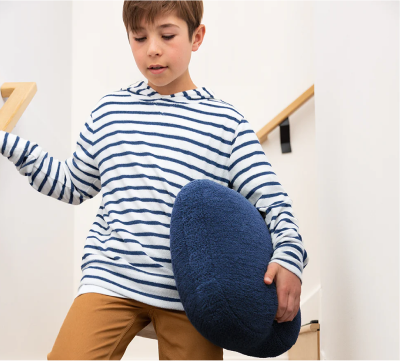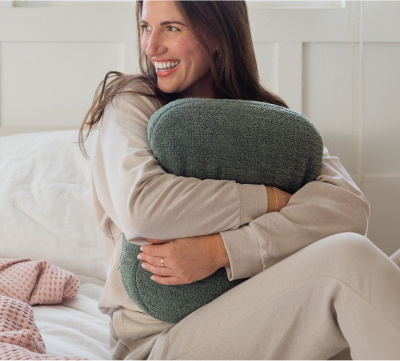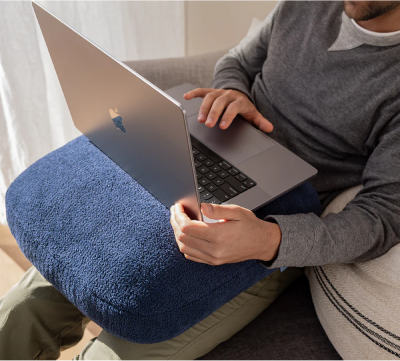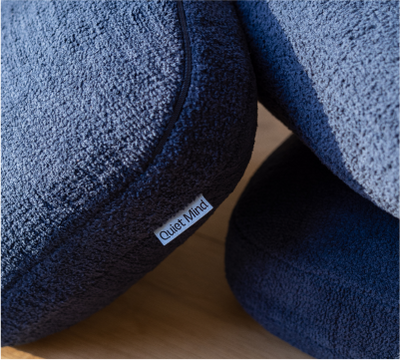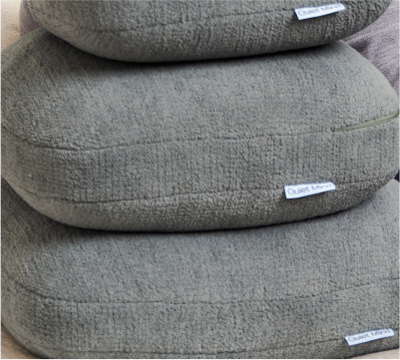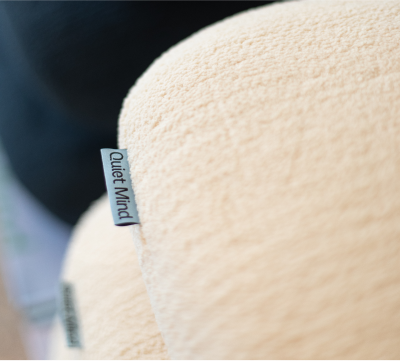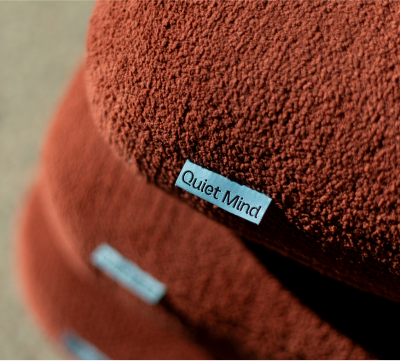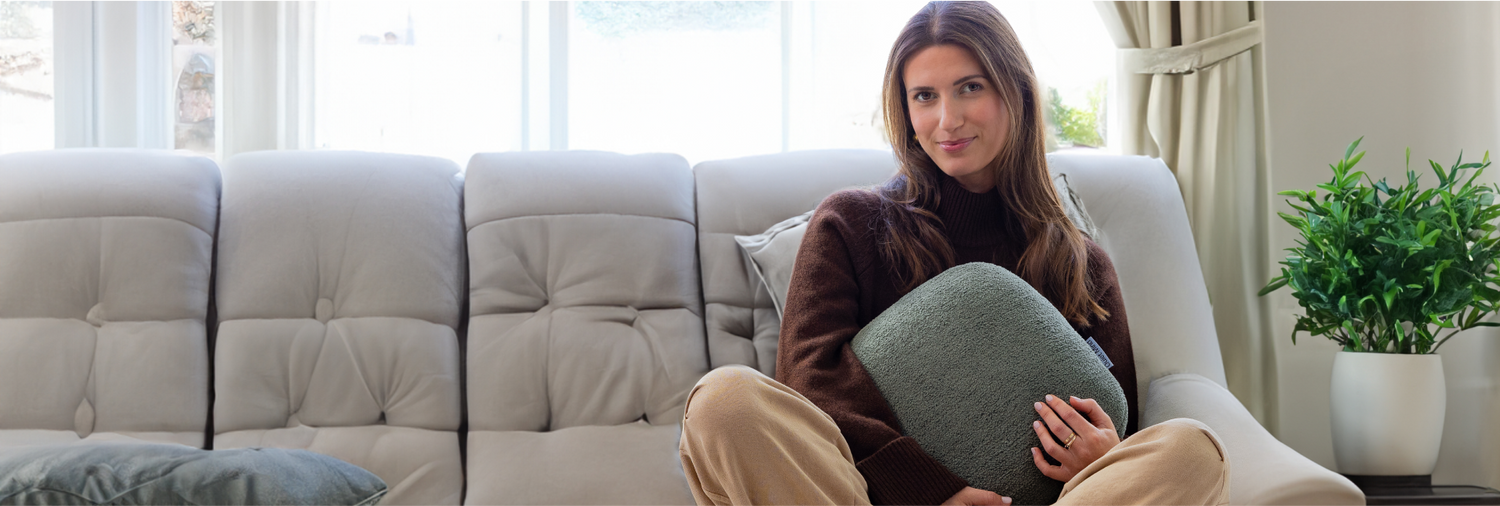A good night’s sleep is not something you should have to earn. It’s something your body deserves.
Weighted blankets have gained popularity as tools for calming the nervous system, soothing restless minds, and improving sleep quality. For many, sleeping with a weighted blanket provides a steady, grounding sensation that helps signal safety and ease.
But what happens when that comfort seems to cause discomfort, specifically, in the form of back pain?
In this article, we explore the link between weighted blankets and back pain, including what causes it, how to prevent it, and how to decide if a weighted blanket is suitable for your body.
What Is a Weighted Blanket?
A weighted blanket contains evenly distributed fill, usually glass beads or micro-pellets, stitched into small quilted pockets. The result is a blanket that lays across the body with intention. Rather than just covering the skin, it applies deep touch pressure, a calming input that mimics a firm hug.
This pressure of a weighted blanket stimulates the release of serotonin and melatonin, while helping to reduce cortisol. These shifts in brain chemistry are part of the effects of deep pressure stimulation and are linked to feelings of calm, emotional regulation, and more consistent sleep.
The use of weighted blankets is often recommended for individuals with sensory sensitivities, mental health conditions, or anxiety, but they are increasingly used by anyone looking to enhance their sleep routine or reduce nighttime overstimulation.
Can Weighted Blankets Cause Back Pain?
While weighted blankets work well for many, they are not risk-free. In some cases, the weight of a weighted blanket, especially if poorly chosen or used improperly, can lead to back pain or worsen pre-existing back conditions.
Pressure on the Spine
When a blanket is too heavy, such as a 12lb option that may exceed your comfort range, it can place excess pressure on your back, especially for back or stomach sleepers. Over time, this may:
- Disrupt spinal alignment
- Increase joint or muscle pain
- Cause back pain associated with improper pressure
- Worsen pain with a weighted blanket in users with low core stability or mobility
Excessive pressure from a weighted blanket can disrupt spinal alignment, potentially causing or worsening pain. Research has shown that consistent pressure on the spine can affect posture and increase discomfort, especially for those with pre-existing conditions like arthritis or scoliosis.
Limited Movement at Night
While many users appreciate that weighted blankets can help reduce tossing and turning, this stillness can also become a drawback. If the blanket restricts movement too much, you may stay in the same position for too long, leading to pain in areas like the neck, hips, or lower back.
Those already dealing with back issues or health conditions such as scoliosis, arthritis, or herniated discs may be more vulnerable to these effects.
The Importance of Proper Weight Selection
Choosing the right weight is one of the most important ways to ensure that your blanket supports your body without strain.
Finding Your Ideal Weight
A general guideline is that a weighted blanket should weigh around 10% of your body weight. For example, if you weigh 160 pounds, start with a 15–18 lb blanket. However, this is just a starting point. Sensory needs, muscle tone, and body frame all affect how the weight of the blanket feels.
The effectiveness of weighted blankets depends on comfort, not pressure. If the blanket feels constricting, it may cause or worsen discomfort. If it’s too light, it may not offer the benefits of deep pressure.
If you’re first using a weighted blanket, try it for shorter periods, like during quiet reading or meditation. Let your nervous system adjust before moving to overnight use.
Signs Your Blanket May Be Causing Back Pain
If you notice changes in how your body feels after introducing a new blanket, it’s worth paying attention to the signals.
What to Look For
When pain or discomfort follows the use of a weighted blanket, it may appear in subtle ways at first. Watch for:
- Lower back pain upon waking
- Neck pain or tight shoulders
- Localized soreness in areas directly under the blanket
- Pain after using the blanket for prolonged periods
- Relief or improvement when you stop using a blanket for a few nights
While these symptoms don’t always point to the blanket as the cause, they may suggest that the weighted blanket increases strain on pressure points or isn’t the right fit.
How to Prevent Back Pain from Weighted Blanket Use
The impact of weighted blankets depends heavily on how they're used. The goal is to create comfort, not compression, especially if you're prone to back pain associated with tension or posture.
Before choosing a blanket, take time to assess your current needs, sleep habits, and comfort preferences. Here’s how to reduce the risk of back pain while still enjoying the benefits of deep touch pressure.
1. Choose the Right Weight and Size
As a rule of thumb, a weighted blanket should weigh about 10% of your body weight. But some people need less, especially those with pre-existing back conditions, smaller frames, or lower muscle tone.
A heavy weighted blanket that feels overwhelming can lead to back pain, while a lighter one may offer a sense of grounding without strain. Let comfort be your guide. Remember: blankets are designed to provide support, not stress.
2. Prioritize Even Weight Distribution
Clumping, sagging, or uneven fill can lead to inconsistent pressure across the spine. A well-made blanket distributes the weight evenly, reducing localized tension and supporting natural alignment.
Look for stitched pockets, breathable materials, and even drape when choosing a weighted blanket, especially if you’ve experienced pain when using one in the past.
3. Consider Your Sleep Position
Your posture during sleep influences how you feel in the morning. Sleeping under a weighted blanket as a:
- Back sleeper: Use a supportive pillow to maintain spinal alignment. Ensure the pressure of the weighted blanket doesn’t force your spine into the mattress.
- Side sleeper: Add a pillow between your knees to ease hip and lower back tension. Adjust the blanket so it doesn’t pull unevenly across your side.
- Stomach sleeper: This position is less compatible with heavier blankets. It can cause or worsen neck pain and lower back tension due to unnatural spinal curvature.
Adapting your setup can reduce the pain associated with poor positioning and help you improve sleep quality overall. Finding the best sleep positions for weighted blankets ensures the pressure is distributed evenly and comfortably, supporting your joints, easing tension, and maximizing the calming effect throughout the night.
4. Ease In Slowly
Instead of jumping straight into full-night use, try wearing the blanket for short periods, such as 30–60 minutes while reading or meditating. This allows you to observe the effects of weighted blankets on your body before sleeping with it overnight.
Pair it with a mindful wind-down: dim lights, quiet music, or a warm herbal tea. These gentle rituals help your body associate the blanket with comfort and safety. Adding a scented weighted pillow, like the one from QuietMind, can offer extra grounding during this transition, helping your body soften into stillness.
Alternatives to Full-Body Weighted Blankets
If you’ve found that the weight of the blanket or pressure from weighted blankets causes discomfort, there are other calming tools to try.
Weighted Shoulder Wraps or Lap Pads
These smaller versions focus deep touch pressure on the upper body or thighs, ideal for people with back issues or those easing into sensory support. They’re also helpful during the day when full-body weight may be overstimulating.
Massage Tools and Gentle Compression
Tension often accumulates in small areas, like the neck, lower back, or shoulders. Massage rollers, compression wraps, or gentle yoga can complement the use of a weighted blanket or serve as a substitute when pain persists.
Weighted Pillows
The original weighted pillow by QuietMind offers a more flexible, low-profile option that can be used on the chest, lap, or shoulders. It provides the calming effects of deep pressure stimulation without the full-body load.
Weighted Blankets vs. Weighted Pillows: Which Is Right for You?
Weighted blankets and pillows both deliver deep touch pressure, but they serve different needs.
Drawbacks of Weighted Blankets
- Heavy and bulky, difficult to adjust during sleep.
- Can trap heat, making them less comfortable for hot sleepers.
- Restrict nighttime movement.
- More expensive than smaller calming tools.
Advantages of Weighted Pillows
- Portable and versatile, usable in bed, on the couch, or at work.
- More affordable than a full blanket.
- Targets pressure to chest, lap, or shoulders.
- Easy to integrate into daily routines, not just at bedtime.
Learn more about how Quiet Mind Weighted Pillows help with sleep and anxiety.
Final Thoughts: Listen to Your Body First
Weighted blankets helped many people find calm, rest, and emotional regulation. But they are not one-size-fits-all, and like any support tool, they must be used thoughtfully.
If you're experiencing back pain after using a weighted blanket, don't ignore the signal. It may be your body's way of saying the blanket can also create stress instead of easing it. That doesn’t mean the practice is wrong, just that the method may need adjusting.
Sometimes the blanket can lead to deeper rest. Other times, the pressure of a weighted blanket may be too much. What matters most is how it feels in your body, your breath, and your sleep.
Let the use of weighted blankets be intuitive, not prescribed. Gentle, not heavy. Supportive, not rigid.
When chosen well and used with awareness, a weighted blanket may become a trusted part of your sleep routine. And if it doesn’t? That’s okay too. Rest isn’t a formula, it’s a relationship.
About Us
At QuietMind, we understand that comfort is deeply personal, what soothes one body may overwhelm another. That’s why we focus on tools that support the nervous system gently, through sensory-informed design and thoughtful pressure.
Our original weighted pillow offers a flexible way to experience calming input without the intensity of a full-body blanket. Whether you're easing into rest, managing back pain associated with stress, or simply seeking stillness, it can help create a sense of safety without strain.
Frequently Asked Questions
Can a weighted blanket cause or worsen back pain?
Yes, a weighted blanket may contribute to pain or discomfort if it’s too heavy or not suited to your sleep position. A blanket that is too heavy can place extra pressure on your back, especially if you have a pre-existing back condition.
How do I know if the weight of a blanket is right for me?
A weighted blanket should weigh around 10% of your body weight, but comfort matters more than math. Start light and pay attention to how your body feels during and after use. The goal is grounding, not pressure.
Are weighted blankets safe for people with back issues?
They can be, but not always. If you have back issues like herniated discs, scoliosis, or chronic tension, consult a healthcare provider before using one. The impact of weighted blankets depends on weight, body type, and sleep habits.
What are signs my weighted blanket is causing pain?
If you notice lower back pain, neck pain, or joint or muscle pain after sleeping with the blanket, or if discomfort improves when you stop using it, it may be a sign the weight of the blanket isn’t right for you.
Can I still use weighted pressure if full blankets cause discomfort?
Yes. Try alternatives like weighted pillows, lap pads, or shoulder wraps. These offer the benefits of deep touch pressure with less strain and more flexibility for sensitive areas like the spine or hips.



